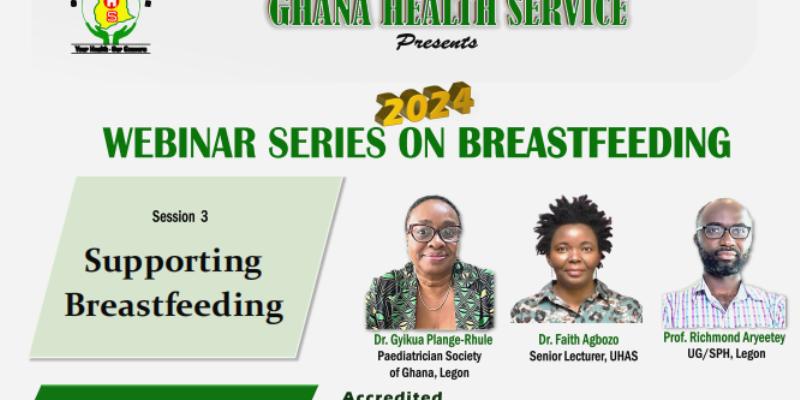On December 7, 2024, the Ghana Health Service (GHS), in partnership with UNICEF and the World Health Organization (WHO), hosted a webinar on Supporting Breastfeeding. This virtual session, held via Team, was designed to engage Allied Health professionals, students, and the general public in a discussion on the importance of breastfeeding, its benefits, and the challenges facing its promotion in Ghana.
The webinar featured three renowned experts in maternal and child health: Dr. Gyikua Plange-Rhule, a pediatrician from the Pediatric Society of Ghana; Dr. Faith Agbozo, a senior lecturer at the University of Health and Allied Sciences (UHAS); and Prof. Richmond Aryeetey, a professor at the University of Ghana’s School of Public Health. The discussions revolved around the science behind breastfeeding, its role in child development, and the interventions needed to improve breastfeeding rates in the country.
Breastfeeding: A Science-Backed Practice
One of the central themes of the webinar was the scientific basis of breastfeeding. While many view it as a cultural or traditional practice, research has consistently confirmed that breastmilk is the most complete and ideal form of nutrition for infants. Prof. Aryeetey highlighted that the composition of breastmilk is uniquely suited for human babies, providing essential nutrients, antibodies, and enzymes necessary for their growth and immune protection. He explained that breastmilk is not just food but a biologically active fluid that adapts to meet the specific needs of a baby at different stages of development.
Additionally, the session emphasized the importance of early initiation of breastfeeding, which is recommended within the first hour of birth. Early breastfeeding provides newborns with colostrum, often referred to as “liquid gold,” which is rich in immune-boosting properties that protect against infections. The discussion also reinforced the need for exclusive breastfeeding for the first six months, during which babies should receive only breastmilk without water or other foods. Studies have shown that exclusive breastfeeding reduces the risk of diarrhea, respiratory infections, and malnutrition, significantly improving infant survival rates.
Breastfeeding as an Investment in Child Development
Beyond its immediate nutritional benefits, breastfeeding was presented as a long-term investment in a child’s future. The experts highlighted research linking breastfeeding to enhanced cognitive development, better academic performance, and improved social outcomes. According to Prof. Aryeetey, children who are well-nourished from infancy have a stronger foundation for educational and economic success later in life.
The economic implications of breastfeeding were also addressed. Breastfeeding is cost-effective for families, eliminating the need for expensive formula and reducing medical costs associated with childhood illnesses. On a national level, improving breastfeeding rates could lead to substantial healthcare savings by reducing cases of malnutrition, obesity, and other diet-related non-communicable diseases.
Challenges Facing Breastfeeding in Ghana
Despite its benefits, breastfeeding rates in Ghana have declined over the years. The panelists noted that exclusive breastfeeding rates have dropped from 63% in 2008 to 43% in 2018, a concerning trend that requires urgent intervention. Several factors contribute to this decline, including cultural practices, lack of workplace breastfeeding support, aggressive formula marketing, and limited public awareness about the benefits of exclusive breastfeeding.
One of the significant barriers discussed was the short duration of maternity leave in Ghana, which often forces working mothers to introduce alternative feeding methods before their babies reach six months. Prof. Aryeetey emphasized the need for policies that extend maternity leave and promote breastfeeding-friendly work environments.
There was also a discussion on misconceptions surrounding breastmilk, with some mothers believing that formula is a superior alternative. However, research has consistently shown that no formula can replicate the complete nutritional and immunological benefits of breastmilk. The panelists urged health professionals to provide proper education and counseling to mothers to counter these misconceptions.
Interactive Q&A Session
The webinar concluded with an engaging question-and-answer session, where participants sought expert advice on various breastfeeding challenges. One of the recurring concerns was low milk production among mothers, to which Prof. Aryeetey explained that breastmilk production works on demand and supply—mothers who breastfeed more frequently naturally produce more milk. He advised healthcare professionals to support and reassure mothers who experience challenges rather than encourage them to switch to formula prematurely.
Another question raised was the role of formula feeding in modern childcare, especially for mothers who return to work early. The experts acknowledged that while formula may be necessary in certain medical conditions, it should not be promoted as a default alternative to breastfeeding. They emphasized that expressing and storing breastmilk is a viable option for working mothers who want to continue exclusive breastfeeding.
Call to Action
The webinar ended with a strong call to action from the experts, urging stakeholders at all levels—health professionals, policymakers, employers, and families—to prioritize breastfeeding promotion. They highlighted the need for:
- Greater investment in breastfeeding education to increase public awareness.
- Stronger workplace policies to support working mothers, including extended maternity leave and lactation-friendly spaces.
- Enhanced community support to ensure that mothers receive the necessary guidance and encouragement.
Prof. Aryeetey concluded with a powerful message: “Breastfeeding is not just about feeding a child—it is about securing a healthier future for Ghana.”
As Ghana continues to work towards improving maternal and child health outcomes, supporting breastfeeding must remain a top priority. Through continued education, advocacy, and policy interventions, the country can ensure that more infants receive the optimal nutrition they need to grow, thrive, and contribute to national development.



